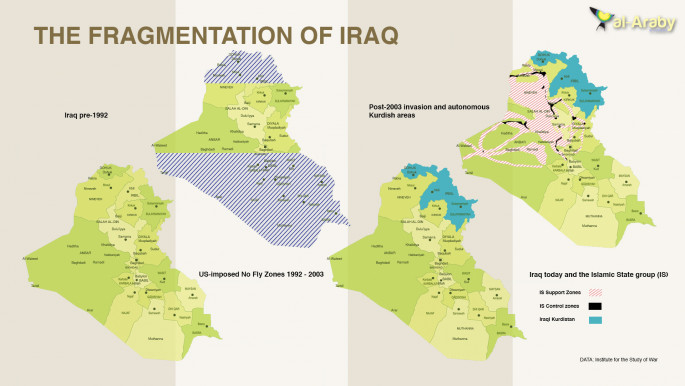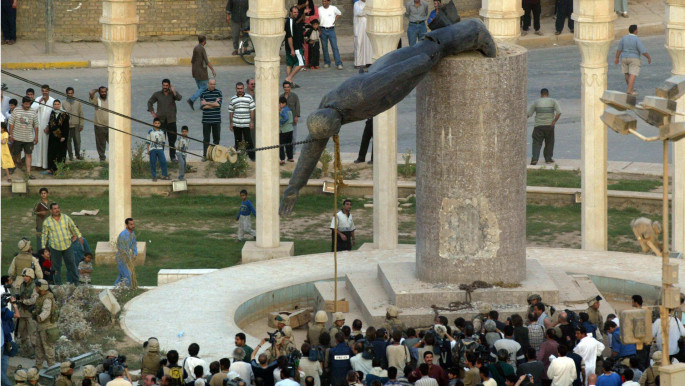12 years since the invasion; 12 years of despair
The US had cajoled and bamboozled the world into thinking that Saddam Hussein's regime - which played its own part in the charade - was building weapons of mass destruction and supporting al-Qaeda, then America's prime target in its 'war on terror'.
Aims changed, however. No weapons of mass destruction were found. Al-Qaeda appeared on the scene only after the occupation. And the Iraqi state was dismantled with a promise to 'bring democracy to the Middle East'.
Twelve years on and violence is threatening to overwhelm a country that is fragmenting along sectarian lines. Al-Qaeda's successor, the Islamic State group (IS, formerly Isis), has taken over a third of the country.
US warplanes are back, bombing IS targets, as Iranian soldiers and commanders lead the battle on the ground.
Corruption is rife and Iraq is a shattered economy. Sectarian murders and general lawlessness blights the country. There seems to be no end to Iraq's trouble.
 |
| Click here for larger image |
Al-Araby al-Jadeed takes a look at how events unfolded in the country leading to the situation it faces today:
1990 - Iraq invades Kuwait is leading to what is known as the first Gulf War.
1991 - Iraqi forces are pushed out is following a huge US-led military campaign.
1992 - No-fly zones are imposed on Iraq's north and south, after Iraqi forces brutally put down Kurdish and Shia rebellions.
1998 - In attempts to destroy Iraq's nuclear, chemical and biological weapons programmes, the US and UK launch 'Operation Desert Fox' bombing campaign.
2001 - A series of four coordinated al-Qaeda attacks on 11 September kill over 2,000 people in the United States.
 |
|
2003 - US president George W Bush gives Saddam Hussein and his sons 48 hours to leave Iraq or face war.
On 19 March, a US-led international 'coalition of the willing' begin military operations.
Saddam Hussein is on the run, but is eventually captured in Tikrit on 14 December.
2004 - Iyad Allawi heads the first interim government after US hands over 'sovereignty'.
2005 - Iraqis vote for the first time since the US-led invasion.
 |
|
2006 - Sectarian violence erupts and hundreds are killed.
Saddam Hussein is executed in December for crimes against humanity.
2007 - The province of Basra is handed over to Iraqi forces by the UK, marking the end of nearly five years of British control.
2008 - The al-Qaeda stronghold, western province of Anbar is handed over to the Iraqi government by American forces.
 |
|
A pact is approved whereby all US troops are to leave the country by the end of 2011.
2009 - Six years after the invasion, US troops formally hand over security responsibilities to Iraqi forces and withdraw from towns and cities.
2010 - Parliamentary elections take place in March. In December, Jalal Talabani is appointed as president and Nouri al-Maliki as prime minister.
 |
|
2011 - The last US forces withdraw from the country after failing to reach agreement with Maliki's government over terms for their possible extension.
2014 - After months of violence, Islamist fighters gain access to Fallujah and Ramadi. Sunni rebels led by the Islamic State of Iraq and Syria (Isis) surge out of Anbar Province to seize Iraq's second city of Mosul and other key towns.
US and Iran assist government in repelling attacks, US carries out air raids.
In September, Isis announces its 'Islamic Caliphate' and rebrands itself the 'Islamic State' (IS).
US war planes return in September, leading another international coalition, this time against the IS.
2015 - Since the start of the US-led coalition this year against Islamic State, more than 900 air strikes have been launched.
On 19 March, the anniversary of the invasion, the UN published a horrifying report detailing a litany of crimes and atrocities committed by the Islamic State. It includes reports of killings, torture, rape, sexual slavery and the use of child soldiers.





 Follow the Middle East's top stories in English at The New Arab on Google News
Follow the Middle East's top stories in English at The New Arab on Google News
![Netanyahu furiously denounced the ICC [Getty]](/sites/default/files/styles/image_330x185/public/2024-11/GettyImages-2169352575.jpg?h=199d8c1f&itok=-vRiruf5)
![Both Hamas and the Palestinian Authority welcomed the ICC arrest warrants [Getty]](/sites/default/files/styles/image_330x185/public/2024-11/GettyImages-2178351173.jpg?h=199d8c1f&itok=TV858iVg)
